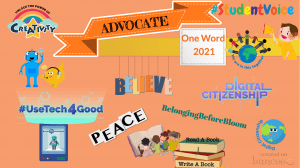We were all so hopeful 2021 would be a better year than 2020, but on January 6th we witnessed frightening events in Washington, D. C.. Our dream of a better year was shattered as we watched the Capitol building overtaken by an angry mob of insurrectionists out to destroy democracy from its very roots. We’re all still struggling to come to terms with the ease of entry and exit this mob had. There is lots of analysis about what and who brought us to this moment. There is much blame flying around which centers on recent events, but if we look more closely we will find the deep-rooted history of racism, fear of “other”, and selfish greed are reasons.
This year I chose advocate (noun and verb) as my #oneword. The dictionary definition of advocate (noun) is one who defends or maintains a cause or proposal or one who supports or promotes the interests of a cause or group. The word advocate can also be used as a verb meaning to support or argue for (a cause, policy, etc.) or to plead in favor of someone or something. While they are pronounced differently depending on how it’s used in a sentence, the meaning is clear and unequivocal. Someone who advocates or is an advocate is able to see all sides of an issue but place himself with empathy and compassion. Here are some examples:
When my son was a few years old, he was diagnosed with chronic asthma and a severe allergy to all types of nuts; peanuts or legumes and tree nuts like walnuts and cashews. His asthma was seasonal and mostly occurred during the winter or when we had a dust storm. His nut allergies first appeared when he was 4 years old when he had a reaction to counting with cashew nuts in his kindergarten class. In the early 1990s when he was newly diagnosed and too young to explain his own needs to his teachers, classmates, and friends, I was his advocate. Nut allergies were not common and management of chronic asthma in children wasn’t a major concern. In school, I made sure the nurse knew about his health concerns and allergies. In fact, when I found out they didn’t have a nebulizer in the school clinic, I gifted one. My son often ended up in the nurse’s office if something triggered an attack and having the nebulizer on hand meant not having to take him to the hospital for care. However, he faces the most difficulty during school or class celebrations since he was not being able to eat food prepared outside our home. I was his advocate every year until he was able to explain himself. He is very good at advocating now and will tell waiters, “I can die if you serve me anything with nuts, nut oil, or even the smallest bits.”
I’m writing this on Rev. Martin Luther King, Jr. Day. I’m an advocate of the Black Lives Matter movement and gender rights. I am a co-host of Courageous Conversations in EdTech with Melody McAllister and Victoria Thompson. We advocate for inclusivity, equity, and accessibility to edtech for all students. We want to hold companies, leaders, policymakers, and teachers accountable for the decisions made about what we use in our schools and classrooms. Perhaps it’s my age and all the years of acquired wisdom, or maybe I am more aware of my voice aand how one person can make a difference.
Here are some examples of how we can all become advocates for our students and children:
Does your school have Spirit Days? Crazy Hair Day for example? When we have children in our classrooms from a variety of cultures and races, someone’s idea of “crazy hair” maybe another child’s normal hair. As I listened to Ramona Meharg’s podcast guest today, her guest Arianna Lambert mentioned this as a traumatic memory from her childhood. There are many other ways to create community and a sense of fun at school without making some feel like they are different.
Learn about all religious holidays to create an understanding and respect for all celebrations and beliefs. I wrote more in a recent blog post.
Before making rules like this learn the cultures of your students
Create a sense of belonging in your classroom by welcoming, accepting, and validating each student’s heritage. Literature is a great way to showcase different cultures and languages.
Allow your students to use their voices and offer them choices when planning your lessons and assessments. This will increase their confidence and create a safe space for them to learn and reflect on their learning.
How will you become an advocate for yourself, your students, and causes important to you? What are some ways you can begin this journey if you haven’t started already?
I’d love to hear your thoughts in the Comments.

